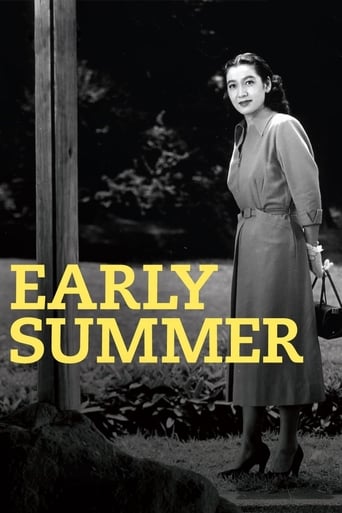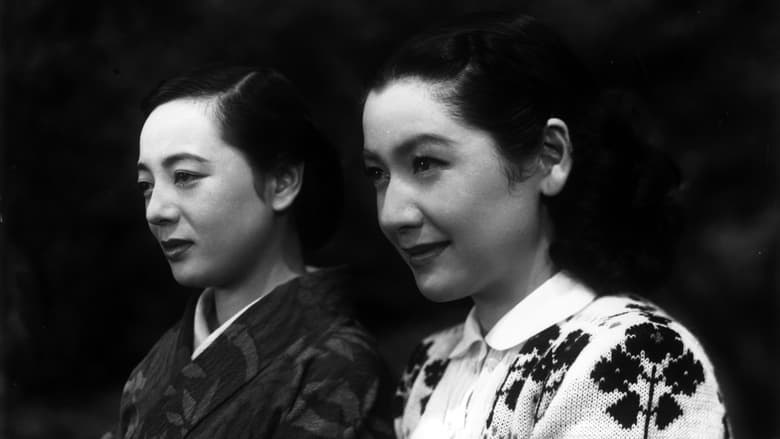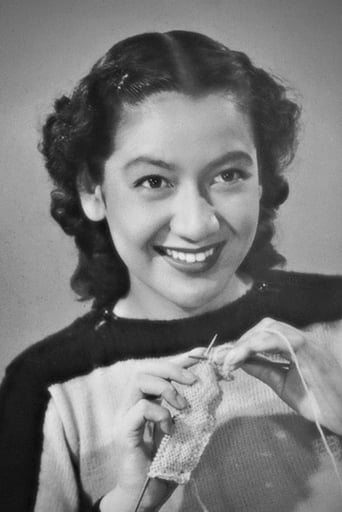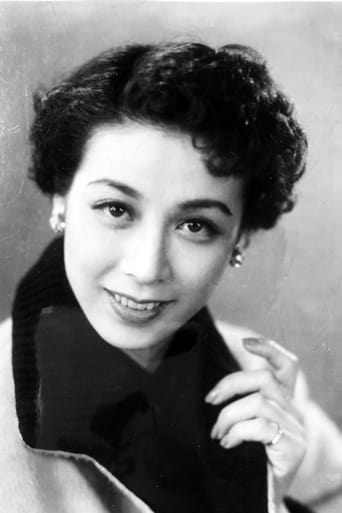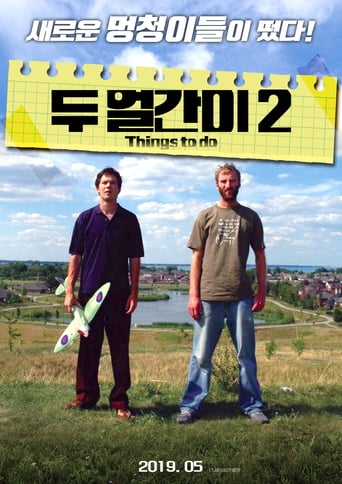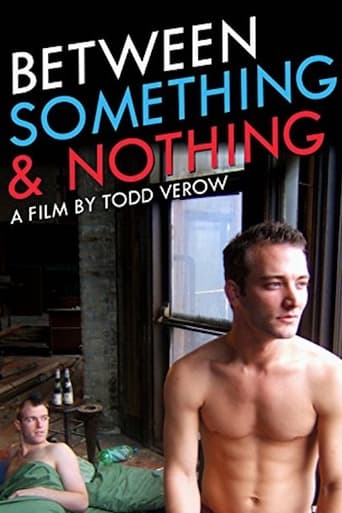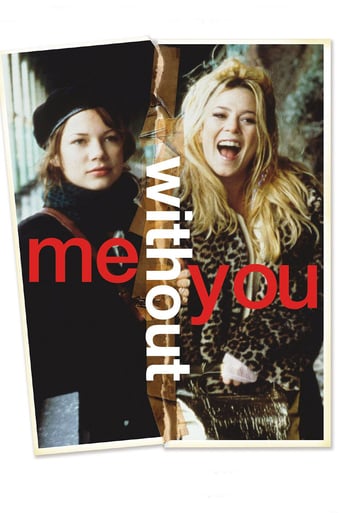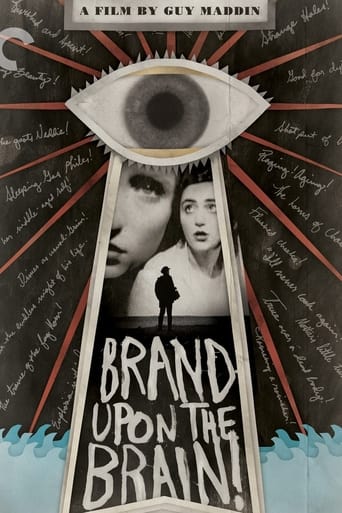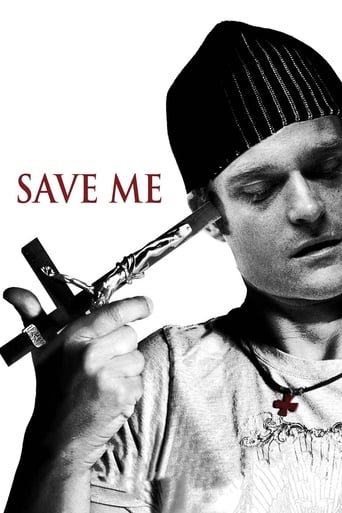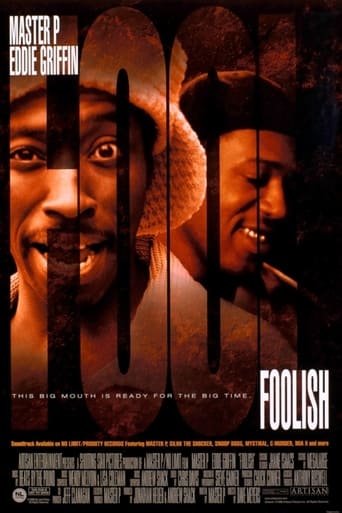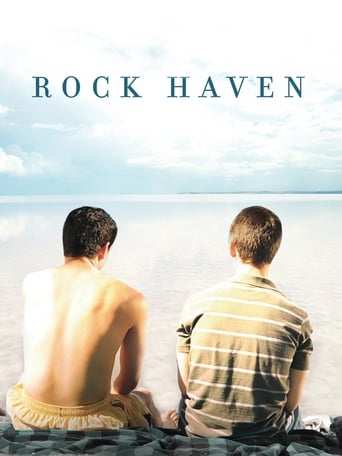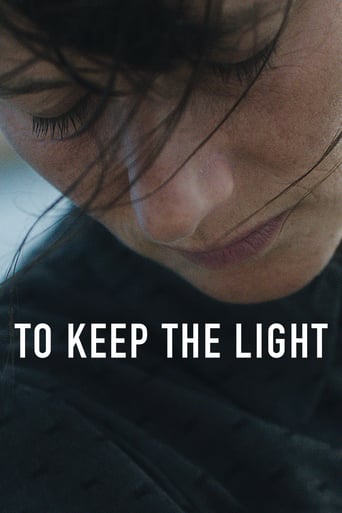Early Summer (1972)
A 28-year-old single woman is pressured to marry.
Watch Trailer
Cast


Similar titles
Reviews
Absolutely the worst movie.
Although I seem to have had higher expectations than I thought, the movie is super entertaining.
While it is a pity that the story wasn't told with more visual finesse, this is trivial compared to our real-world problems. It takes a good movie to put that into perspective.
True to its essence, the characters remain on the same line and manage to entertain the viewer, each highlighting their own distinctive qualities or touches.
There is a great harmony in everything about this film, which has a Japanese family of three generations wondering if it's time for the 28-year-old daughter (Setsuko Hara) to get married, and proposing an opportune match. Director Yasujiro Ozu uses many of his trademarks, both in content (e.g. two rascally little boys adding a cute element) and in style (e.g. with regular use of those shots from the mat, directly into a character's face as he or she speaks). While some of those things and the overall primness of the film threatened to get on my nerves, I have to say, I enjoyed it, and it finished strong.In the film, Ozu gives us lessons in being gentle, patient, and bearing with the inevitable changes in life, and he does it in a simple way. Hara seems to be constantly smiling and cheery which may seem a little one-dimensional, but she ultimately stands up for herself in her own, non-confrontational way. The conversation she has with her friend, where the two discuss whether a love based on trust and friendship is true love, is deeply meaningful. The conversation she has with her sister-in-law while they're at the beach, the only one Ozu ever used a crane for, and where they talk about sacrifice and living a life without a lot of money, is as well. The film gradually builds you to these strong late scenes, so if you're less into it early on, I would encourage patience. The subtle way in which a possible marriage is discussed, and not directly by the two involved (being intentionally vague here), is both cute and an insight into the culture. There are also universal, sentimental themes. The mother and father (Chieko Higashiyama and Ichiro Sugai) turn in strong performances, and the scene where they talk about a son who was missing in action in the war is striking. Their posing for a family picture, all smiles and jovial between takes, but then looking solemn before the picture is taken, is fantastic. The father's silence and patience as events in his family unfold culminates eventually in him recognizing that we all wish we could stay together with family members as they are, but that things inevitably change. It's quite beautiful.
Calm and serene with a thin plot, "Early Summer" looks at a family and the changes it undergoes as a result of one of its members deciding whether or not to marry. The movie is set in early 1950′s Japan which was under American occupation and associated social influences at the time. Noriko (Setsuko Hara) is a clerk in her late twenties under pressure from her family at home to find a suitable husband. Even her boss at work jokingly suggests she should meet an old school friend of his to see if they're a good match for each other. Noriko sweetly bats off all these hints that she's nearing her meat-market use-by date and should be settling down to obedient, passive housewifely duties. Her social set divides into singleton and married-women camps arguing the pros and cons of single-hood and supposed wedded bliss so she's well aware of what she'd be walking into if she got that gold band on her finger. Interestingly, the one person who doesn't hassle Noriko about getting married is her sister-in-law who's harried by two small sons spoilt by their grandparents.The visual style of "Early Summer" is highly commendable: the camera positions place considerable physical space between us viewers and the characters. The cameras themselves are set at table height or at the level Japanese people traditionally kneel down to eat at low tables at home. Deep focus fixed-camera shots are used so people are often filmed in the background having conversations or doing things while framed by doorways, furniture and other interior fixtures. If the camera moves at all, it is to track people coming towards it or going away from it, or to pan slowly across the screen over a nature scene. The effect is to give "Easy Summer" a static, almost stage-like quality and viewers will feel very much like voyeurs peeking into people's private business. The very minimal acting places psychological distance between us and the characters. By forcing such physical and psychological distance, viewers observe the story as it develops and don't get deeply involved; this helps to reinforce the film's theme about how change affects families and the relationships within them for better and for worse. We shouldn't get upset if people suffer as this may be a short-term effect of the change and there may be long-term benefits; equally a short-term benefit may lead to adverse long-term effects."Early Summer" observes the pressure Noriko is under to conform to tradition and expectations amid fluid social, political and economic conditions, and the frustrations and distress that she experiences when social custom clashes with changing reality. At first she's unwilling to surrender her freedom, financial independence and closeness to her relatives but after continued pressure from family and friends alike, she suddenly decides to marry a widower with a child. The irony of her decision is that her relatives disapprove of the idea of a proved family man as husband over a man aged 40 years who's never married and might not be family-man material; and Noriko's impending marriage means her income will be lost to her family so her brother and his brood must move to a smaller house in Tokyo and the parents must live in the country. The hypocrisy and shallowness inherent in forcing a woman to marry purely to preserve social standing and harmony without thought for practical consequences become apparent.The acting is so sparing in its expression as to seem stereotyped: most of the women are chirpy and giggle a lot; the men stick to one mode of expression throughout the film so Noriko's boss is usually jovial and her dad and various other aged people usually act bemused at the pace of modern life. Hara does a good job within the limits set by director Ozu at portraying a woman who hides her anger, sorrow and despair behind a cheery and upbeat façade.Scenes of restless nature (beach scenes of rolling waves near the beginning and the end of the film, a scene at the end of rippling wheat ready for harvest) and of the Tokyo cityscape reflect the ongoing and impassive nature of change. The small children with their obsession with model train sets and demand for lollies and gifts are the focus of a small subplot emphasising generational differences which come with social and cultural change.Slow and reserved it may be but "Early Summer" isn't at all stodgy; it just glides by, inviting neither scorn nor sympathy for its characters. The film does suffer from not being in colour which would enhance Ozu's style of filming by adding depth to deep focus shots. Mood and atmosphere might be improved with appropriate colour choices in the interior and costume design. One aspect of "Early Summer" that some viewers might find troubling is the fatalistic attitude expressed by Noriko's parents in their new digs in the country when they kid themselves that they're happy and shouldn't ask for more in life. Their facial expressions suggest their confusion, unhappiness and feeling of being tricked or trapped in some way at the way things have turned out as a result of their daughter bowing to convention and tradition. This moment captures very well the bewilderment of a society caught up in political, economic and social changes not always of its own making.
This film stars Setsuko Hara, a regular in Ozu films, who, to me, has to be one of the finest if not the finest actress Japan has ever produced. She exudes warmth in her roles and when she smiles can rightly be considered beautiful. She plays Noriko, a 28 year old single lady her family wants to marry off. If you think you have seen this before in Ozu's "Late Spring", you kind of have, but its still a great film. It is a testament to Ms. Hara's beguiling strength that she can pull off this role so admirably. Unlike "Late Spring" (which is also great), this film is more comic. There are little moments that will make you smile. Noriko's best friend in the film Ayako is also single and they make fun of their married female friends. This movie moves faster than "Late Spring" and the magnificent "Tokyo Story", and it heads towards the end which may fill you with mixed emotions. Ozu, to me, is one of the finest directors ever, from any country. He is a master of subtlety, and the performances he is able to get out of his actors is downright stunning at times. The combination of Ozu and Ms. Hara in film was one of the greatest pairings of actor/director ever. You just love Noriko in this film. The trilogy of "Late Spring", "Early Summer" and "Tokyo Story" is a must watch. I think you'll love it.
The style and pacing of Bakushu is similar to Tokyo Story but unlike the latter, Bakushu's central theme of arranged marriage over individual choice seems awfully dated and for this reason the film does not rank as highly as Tokyo Story. At the end of Tokyo Story both my wife and I felt compelled to examine our relationship(s) with our respective parents. The theme of Tokyo Story (sons and daughters relating to aging parents) is much more universal and therefore much easier to identify cross-culturally. Although the concern the entire family shows for the daughter Noriko's marriage may seem unusual to western viewers it is still very much a reality in many parts of Japan. Once this can be realized or accepted then Bakushu can take on the same poetic beauty that can be found in all of Ozu's work. The cinematic style is another thing altogether and may take a lot of getting used to as will the sure volume of characters which is probably five times as many as can be found in most western films. Ozu bears repeated viewing as his subtlety and outrageously awkward camera placements are an acquired taste but for those who persevere there are many rewards.

